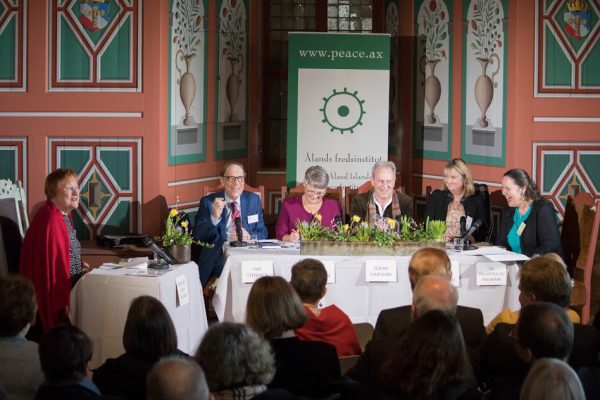When the Åland Islands Peace Institute organises Kastelholm talks on peace for the fifth time, the theme was “Democracy, Participation and the Role of Civil Society”. The Kastelholm talks are recurring discussions about peace, under the patronage of the former President of Finland, Tarja Halonen. The talks are always held in connection with Åland’s demilitarisation day, which is 30 March. The talks of 2019 were held on Thursday, 28 March.
The Kastelholm talks began with a panel discussion in Kastelholm Castle where the patron of the talks President Tarja Halonen discussed with a panel consisting of Ms. Maud Olofsson, former Minister for Enterprise, former Member of Parliament and Deputy Prime Minister of the Swedish Government; Mr. Pär Stenbäck, former Minister of the Finnish Government, former Member of Parliament and Party Chairperson of the Swedish People’s Party; Ms. Li Bennich-Björkman, Johan Skytte Professor of Eloquence and Political Science, affiliated with the Institute for Russian and Eurasian Studies at Uppsala University and Mr. Göran Djupsund, Professor of Political Science, election commentator in Finnish-Swedish television and former Principal of Åbo Akademi University in Vaasa. The discussion was moderated by the Peace Institute’s Director, Associate Professor Sia Spiliopoulou Åkermark.
The theme – democracy, participation and the role of civil society – is important to discuss in a time where many question democracy or believe it to be weakened. We observe totalitarian tendencies in Europe and infringements of important democratic foundations. The interest in political parties is decreasing, as is voter turnout. Politicians and journalists are threatened for their opinions and work. At the same time, politicians occasionally express the opinion that they lack power to actually decide on significant issues or realising major projects. Globalisation of the economy and many cross-border issues, such as environmental or public health, place new demands on decision-making and collaboration. The citizens also take new initiatives and create new channels that enable common social projects. In addition, social media form both a threat as well as a means for new opportunities.
The Kastelholm talks in 2019 concerned issues such as: What constitutes the core of democracy? Who are the most important guardians of democracy? What makes a democracy vital and sustainable? How can democracy and globalisation coexist? What is the role of civil society?
After the discussion at the Castle, the discussion continued with a round-table discussion at the nearby restaurant Smakbyn. Ms. Moa Lindqvist, doctoral student in education sociology at Uppsala University and researcher on Swedish higher education and Ms. Lotta Angergård, alternate supervisor at Save the Children Åland with years of experience of working with youth and civil society issues and former board member of the Åland Island Peace Institute, initiated the conversation with their perspectives on this year’s theme. Thereafter, the panel at the castle and the audience were free to reflect and discuss. Moderator of the discussion was Ms. Susann Simolin, journalist and information officer at the Åland Islands Peace Institute.
The Kastelholm talks aim to contribute to bring nuance to ongoing peace- and security policy debates, by providing scope for discussions on long-term perspectives and broader contexts on current phenomena and acute crises. The conversation should be a forum for dialogue, rather than debate, where knowledgeable speakers are given freedom and time to reflect together. The round table discussion provides space for the public to meet and discuss with politicians and experts in a relaxed environment. With the talks, the Åland Islands Peace Institute wants to highlight a peace perspective by identifying and discussing solutions and opportunities for peaceful coexistence between countries and regions.
The panel of 2019 consisted of the following speakers:
Maud Olofsson, former Minister for Enterprise and Deputy Prime Minister of the Swedish Government, former Member of Parliament and Chairperson of the Center Party, now own entrepreneur and Chairperson of the Board of Directors of Visita, a Swedish sector and employer’s organisation.
Pär Stenbäck, former Foreign Minister and Minister of Education of the Finnish Government, former Member of Parliament and Party Chairperson of the Swedish People’s Party, with extensive experience of leading positions and positions of trust within international bodies and organizations, including the International Crisis Group and the International Federation of Red Cross and Red Crescent Societies in Geneva.
Göran Djupsund, Professor of Political Science and former Principal of Åbo Akademi University in Vaasa, with expertise in election and electoral behavior and an election commentator in Finnish-Swedish television for decades. In addition, he has also researched on political communication, media development, political behavior and the politicisation of the public sector.
Li Bennich-Björkman, Johan Skytte Professor of Eloquence and Political Science, affiliated with the Institute for Russian and Eurasian Studies at Uppsala University, and Chairperson of the Committee for the Johan Skytte Prize in Political Science. She has researched post-communist politics, research policy and creativity as well as life in exile. Furthermore, she features as a regular columnist in Swedish media, such as Upsala Nya Tidning and a political commentator in Svenska Dagbladet and TT.

Panelists 2019: Maud Olofsson (foto Patrick Trägårdh), Pär Stenbäck (foto Kevin Abosch), Li Bennich-Björkman och Göran Djupsund
Foto: Patricia Holmberg
The Kastelholm talks were live streamed in collaboration with NIPÅ and can be seen here.
The Kastelholm talks 2019 were carried out with support from: The Government of Åland, the Åland Parliament, the Consulate General of Sweden in Mariehamn, the Nordic Institute in Åland, the Swedish-Finnish Cultural Fundation as well as Åland Convention Bureau.
![]()

![]()
![]()
![]()
![]()



